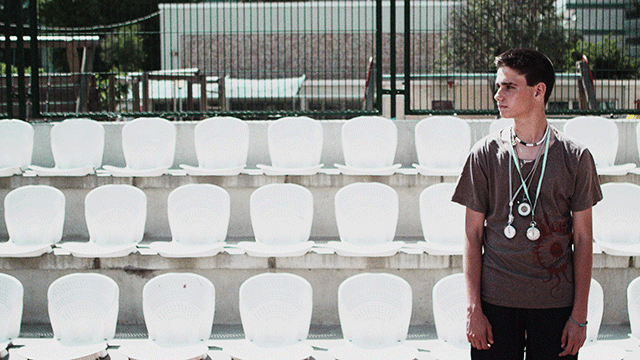Recently shortlisted for the Goyas (the Spanish Academy Awards), Álex Montoya Melià’s tense short film Lucas explores issues of pedophilia and absent fathers figures. Following the titular Lucas during a difficult time in his adolescence as he desperately attempts to impress the girl he’s attracted to, Melia’s protagonist soon finds himself embroiled in a precarious situation as he strikes a suspicious deal with a stranger to raise money.
At almost half an hour in duration, keeping an online audience engaged is always a worry, but Melia’s film gradually intensifies the underlying feeling of unease throughout its narrative, keeping its viewers hooked on the suspenseful situation unravelling within. Never revealing too much, but always implying much more, whilst it’s obvious that all is not right in the relationship between young Lucas and his suspect benefactor Alvaro, the extent of his intentions are never fully revealed until the very end of the film. Whilst covering the subject of pedophilia on screen isn’t a recent concept, it’s a topic that’s always accompanied with certain concerns, director Melia told Short of the Week why he wanted to cover these themes in his narrative:
“It’s an ironic idea: what if a boy finds a father figure in a pedophile or, more precisely, an ephebophile. He’s lost his father to an accident and his family environment has become rarefied, inhospitable. That’s when he meets this guy who talks to him, helps him and levels up with him. I also wanted to portray a complex pedophile: Álvaro is someone who understands he cannot carry out his inclinations, which he puts under a nostalgic, romantic light. He is also used by Lucas. It’s not too dissimilar to Lolita’s Humbert Humbert.”
Featuring some impressive performances from his cast, Melia’s film hinges on the believability of his two main characters, with both needing to display flaws in their characters without ever turning into characterisations of the ‘hunter’ and its ‘prey’. Whilst there is no doubt Luis Callejo’s consistently creepy Alvaro is the ‘villain’ of the piece, the actor’s ability to display the friendly, caring qualities of his character, alongside the actions of an obsessed predator, is at times almost enough to trick you into questioning your suspicions of his intentions. Alongside him newcomer Javier Butler’s portrayal of wide-eyed innocent Lucas and his fumbling, misguided attempts to become a man feel so real and so believable you feel compelled to lean into the screen and give him the guidance he so desperately needs. It’s not just Callejo and Butler impressing on-screen though, the rest of Lucas’ young cast do sterling work in making the short’s narrative convincing and uncomfortable in equal measures. Working with such a youthful set of actors, the director explained (via email) how he tackled explaining the film’s themes to his fledgling performers:
“I was totally open and there was no problem. In the first place, these are kids that were 14 to 16 years old, they were not children anymore. Second, the short film intentionally eluded the most sordid elements. That was mainly because the story focuses on the relationship between these two characters, but also because it was a short film and I had to settle a bit if I wanted to get it done. I’m very happy with the kid’s performances, they were all newcomers from Valencia and they were so willing to learn, they listened so intently. The merit is all theirs, especially Javier, who is a natural.”
Having studied architecture and never attending any kind of film school, Melià has developed his skills as a filmmaker by directing a series of short films from the age of 16. Experiencing various levels of successful at festivals worldwide, the ever-increasing durations of his short films over the years have now convinced the director the next natural step is to make the transition to feature films. First up, is a “more daring and developed” feature-length adaption of Lucas with the short acting as a basis for the first act.

 Rob Munday
Rob Munday